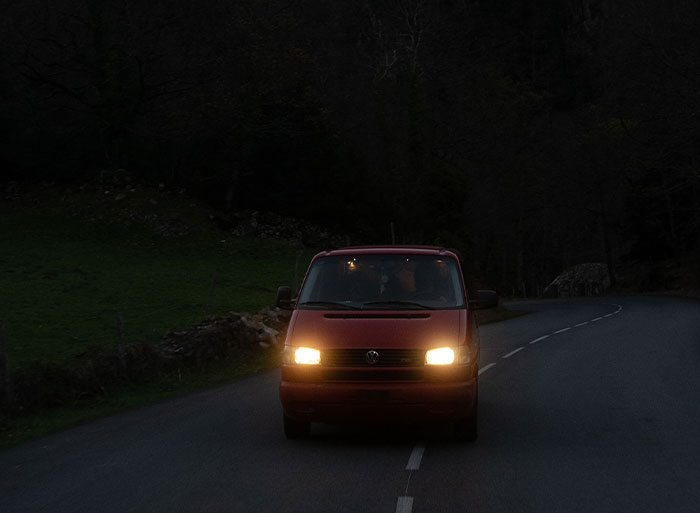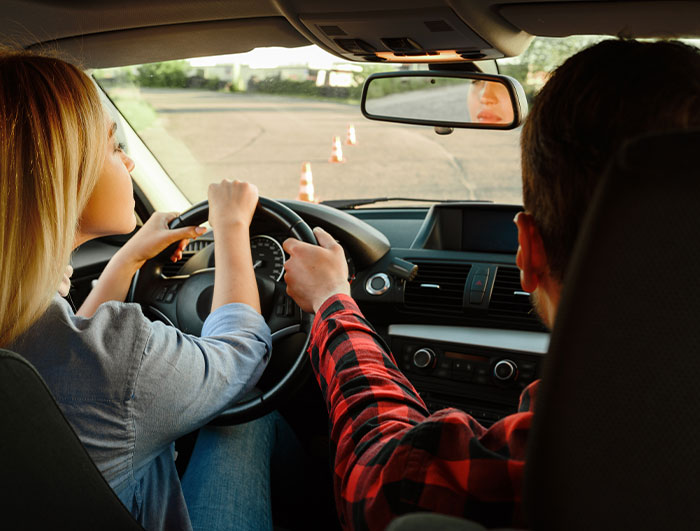If there’s one thing worse than sharing a road with a jerk, it’s sharing a road with a jerk at night. And Reddit user IceAriina is one of the people who has had to experience it.
She was driving home after a tiring long shift at work and was doing her best to stay safe. However, a random guy approached her car from behind in his vehicle and started tailgating the woman.
Luckily, IceAriina kept cool and handled the situation to the best of her abilities. Continue scrolling to check out her story on the subreddit r/PettyRevenge where she told all about it.
This woman was driving alone at night when another car started tailgating her

Image credits: Dario Fernandez Ruz (not the actual photo)
Even though she tried to let it pass, the guy behind her didn’t







Image credits: Erik Mclean (not the actual photo)


Image source: iceariina
We managed to get in touch with IceAriina and she was kind enough to tell us more about that night.
Luckily, during the encounter, it didn’t seem like there would be an accident. “The driver’s behavior was more impatient than aggressive or erratic,” IceAriina explained to Bored Panda. “I wasn’t concerned.”
“I mostly felt vaguely gratified and hugely relieved that I wasn’t speeding or making illegal maneuvers!”
Looking at the situation in retrospect, IceAriina said, “Had I thought of it, I may have put on my hazards and slowed down a bit more for them to pass. There was no shoulder for me to pull over, I’d have gone into the ditch if I’d tried. I’ve done that on other occasions, when possible.”
The author of the post shared more information in the comments


Generally, you shouldn’t be driving when you’re tired
Fatigue isn’t just about falling asleep. Even brief lapses in concentration can have serious consequences when you’re driving. When you’re exhausted, your brain can even enter short periods of sleep called ‘microsleeps,’ which can last from a fraction of a second, up to 10 full seconds. And the worst part is that you can’t control them.
In fact, being awake for more than 17 hours has a similar effect on performance as having a blood alcohol content of more than 0.05, so it’s best to not put yourself at unnecessary risk.
The warning signs of tiredness include:
If you’re behind the wheel, you should:
How to handle tailgaters

Image credits: JÉSHOOTS (not the actual photo)
Remain calm. It’s essential to not escalate the situation because aggressive driving can have devastating consequences. Avoid yelling, gesturing in the direction of the tailgater, and doing anything else that could provoke them even more.
Let the tailgater pass. If you’re on a multi-lane road, move over to the right when it’s safe, giving the driver a chance to pass you on the left and if you’re on a single-lane road like IceAriina was, consider pulling into a well-lit parking lot or gas station.
Stay steady. Speeding up and slowing down can increase your chance of getting hit, so keep your speed consistent so the person behind you knows what to expect. It should allow them to pass when there’s an opening.
Don’t slam on your brakes. Slamming on your brakes to send the driver a message that you don’t like what they’re doing may feel tempting at the moment, but an accident won’t improve the situation. If you need to hit the brakes, do so slowly and steadily to give the car behind you time to react.
Be extra cautious. When someone is following you closely, it can be difficult to predict what they’ll do next, so be careful with your movements and pay special attention to what’s going on everywhere on the road, not just behind you.
“If you run into a road rager, do anything in your power to not stop your vehicle, and call 911,” IceAriina added. “Follow their instructions. Be safe.”
“Remember nothing is so important that you need to risk your own life and the lives of others to get there. Better late than dead.”
To make good decisions on the road, you need to practice

Image credits: NomadSoul1 (not the actual photo)
According to the experts at The RAC, a UK-based automotive services company that provides complete peace of mind to more than 12.7 million Brits, you need to put yourself out there in order to able to navigate situations like IceAriina found herself in.
They believe that if you’re just learning to drive or feel uncomfortable getting behind the wheel after sunset, getting experience in night-time driving can be extremely valuable. And it’s not that difficult — most driving instructors offer evening lessons to give their pupils more confidence.
And just in case, they advise you to stock up for the night in advance. “Every driver should be prepared in case of emergency,” The RAC folks wrote. “A torch is very useful if you suffer a breakdown… and need to inspect your car’s engine or change a tire. Even better – a head torch can free up your hands completely.”
“In case you get stranded or need to wait for assistance, it’s advisable to keep a blanket or warm clothing in the boot,” they added. “It’s also a good idea to keep your mobile charged and carry an ice-scraper or de-icer to clear your windows if the temperature drops.”
If you do break down, find a safe and well-lit place to stop and leave your hazard warning lights on while you wait for help.
And people thought she handled everything really well








Some even shared their own driving stories







 Follow Us
Follow Us





